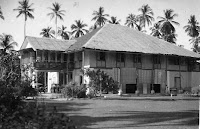
I recently took a detour from presidential bios to read Tim Harford's
"The Undercover Economist: Exposing Why the Rich Are Rich, the Poor Are Poor--and Why You Can Never Buy a Decent Used Car!" (2006). The book makes economics accessible to the layperson, and reinforces my belief that market forces are the best way to solve problems, since the underlying motivation for everyone is self-interest. (And really, I owe a
debt to P.J. O'Rourke for bringing me around to that viewpoint.) Altruism, while nice, isn't sustainable.
Harford does a great job of explaining how scarcity and inside information affect pricing, how Starbuck's customers signal they aren't bothered by price, and how China has made a more successful transition to capitalism than Russia.
In Chapter 5, he details how a national healthcare system could use market forces to encourage patients to ration their own healthcare, while avoiding medical catasrophes that bankrupt them. Additionally, it would make sure the poor were able to afford health care:
"These requirements suggest: people should pay for all medical care; but insurance should cover the largest bills; and that everyone should have a savings account dedicated to medical expenses, to which the government would contribute in the case of the poor or the chronically ill.
Catastrophe insurance, which pays out only when a particular course of treatment is very expensive, is fairly cheap. The savings are no problem either; simply reduce each person's tax bill by, say, $1,500 a year - this is very roughly the cost, in taxes, of both the UK and the US public health systems - and make them put the money in a savings account. For people who pay less than $1,500 in tax a year, the government would contribute money to make up the shortfall. Since the system is compulsory, no adverse selection takes place.
If you participated in such a program, how would it work for you? Your health-care savings would automaticaly go into a high-interest bank account. They would build up gradually throughout your life. For most people, medical bills are low in their younger years. So you could expect to have thirty thousand dollars in your account when you turn forty; more, if you've managed to keep your spending low and watched the money earn interest. Thirty thousand dollars buys a lot of medical care. Of course, it could all be consumed by a single expensive procedure, except that catastrophe insurance restricts your expenses."
He goes on to suggest that the health savings accounts could be willed to heirs, so that at all stages of a patient's life, they would have an incentive to avoid over-using health care. This would avoid having the government making decisions on what procedures were appropriate for any diagnosis.
And the system sketched out has been used in Singapore for more than 20 years, where the average life span is 80, an the total private and public cost of the system is $1,000 per person. Granted, the diet of the average Singaporean is probably significantly different than the average American, but if patients shoulder more of the health expenses incurred by obesity, then perhaps the average serving plate at The Cheesecake Factor would begin to shrink.
Now, while this type of system may not be exactly what Obama had in mind, it does line up with the 3 principles he has outlined:
- Reduce costs — Rising health care costs are crushing the budgets of governments, businesses, individuals, and families, and they must be brought under control
- Guarantee choice — Every American must have the freedom to choose their plan and doctor – including the choice of a public insurance option
- Ensure quality care for all — All Americans must have quality and affordable health care
And, unlike the Clinton plan, it does not put the burden of providing coverage on employers.






















































.jpg)





